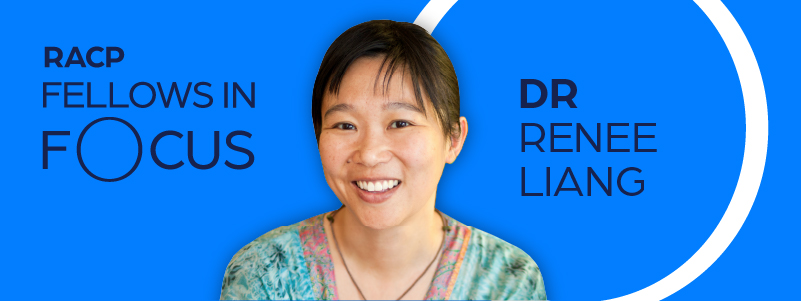RACP Fellows in Focus: Dr Renee Liang
Date published:
03 Feb 2022

Many of the Fellows that we've had the pleasure of meeting over the last 12 months have had incredibly diverse and unique skill sets, but few have such an interesting cocktail of talents quite like Dr Renee Liang.
Renee, a second-generation Chinese New Zealander, is a consultant paediatrician whose research looks at human development trajectories from early life to adolescence. As well as her medical degrees, Renee also holds a Master of Creative Writing from the University of Auckland and a Postgraduate Diploma in Drama Studies. She’s also a Fellow with her own Wikipedia page, which highlights her widely acknowledged success as a poet, librettist, essayist, short story writer and playwright. Unlike other doctors with ‘creative’ side careers, Renee sees herself as having three careers – in medicine, arts and research.
Suffice to say, we were looking forward to meeting Renee and asking her about the symbiosis of her medical and creative talents that have created positive outcomes, regardless of where people experience their first touchpoint of her work.
“I love stories,” she began, as we probed the skills that Renee brings to her paediatric work,
“I bring a narrative focus to my interactions with patients. When I'm working in the acute situation on the ward, in the emergency department, and particularly when I'm working in clinic, I'm unravelling very complicated people and their stories. I bring a storyteller's perspective. I follow the narrative threads. I dive deep underneath through all the layers to see where they all weave together. That's my narrative approach to medicine. It's not an original take, but I feel that my dual training in arts and medicine are complementary because I’m exploring stories every day.”
Renee’s day-to-day sees her working in regional Northland, an area at the tip of the North Island of Aotearoa New Zealand. Northland has a mixed population including communities dealing with low resource, the inequities brought on by colonisation, and remoteness. Sometimes she’s required to hop inside a small five-seater plane and fly out for the day to conduct a remote clinic and at other times she’s involved in teleconsults and the usual ‘bread and butter’ of neonatal care and general paediatric clinics. In her words, she’s “a jack of all trades.”
“I find all the work I do fulfilling, but I have a special place in my heart for the Gateway clinics. These are multidisciplinary, ‘360s’ of all the factors around an individual’s wellbeing, mandated in Aotearoa New Zealand for children who are under state care. It's an intense half day. Going into healthcare, education, social supports, developmental trajectory, passions and life goals of the child and their family. I think I learn more from those families than they get from me. It’s also a privilege that is unique to my work. I hope that by listening and being able to reflect their stories back to them I can help them chart a path forward.”
My career in arts has helped me to hone the ability to listen and identify those pertinent strands of story. In arts I also get to interact with a wider cross section of people as colleagues and friends, than many doctors. I think that helps me look at things from other angles. It allows me to see that as a doctor, what I do is less important than lots of other factors impacting on wellbeing. It also exposes the inequities between different communities and allows me to see just how privileged I am. I hope that I carry those learnings with me into my day to day work in medicine, and also as a clinical teacher.
Renee’s body of work and her three roles i.e. researcher, paediatrician and artist are truly inspirational, and we were curious to tease out of her what motivated and inspired such a diverse set of skills and talents. As she explains,
“I've been lucky to have a variety of mentors, in both medicine and the arts, who have held my hand and supported me through tough times. And there have been many. An early mentor was Professor Tania Gunn, a paediatrician and a member of the College, who took me under her wing when I was a medical student. She told me every successful person has at least “five careers”, and that gave me permission to leap from career to career.”
“Chekhov was also a practicing doctor through his entire illustrious career as a playwright and short story writer. He once wrote to a friend, “Medicine is my lawful wife and literature my mistress; when I get tired of one, I spend the night with the other.” I've always thought, okay, well, why not cheat on medicine when I want to?”
To those future fellows inspired by Renee’s somewhat unconventional career path, she offers some advice:
“Follow your instincts and passion. Don't be too scared to step off because trusting yourself is important. I like to say, “when one door closes, turn around because there are so many others opening behind you”. Spend time outside your comfort zone. I don’t mind not knowing what might happen - I've become comfortable with uncertainty. I think that enables me to try new things and say yes to projects I might not have the skills for yet, but know I can acquire with help and practice.
Whatever choice you make, make it a good one for you. Medicine gifts us with an incredible set of skills for many different careers. Open your senses to the world and your mind to other paths. If your heart is in it, you’re more likely to be happy and to succeed.”